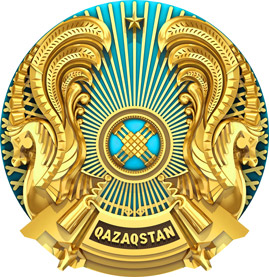Government
Kazakhstan is a constitutional republic.
Since its independence from the Soviet Union in 1991, Kazakhstan has consistently moved towards a stable, democratic transition, which resulted in the establishment of a secular constitution in 1995. The constitution, modeled after Western models of the separation of powers, outlines the responsibilities of the executive, legislative and judicial branches. The executive power is under the President, the Government and the Ministries. The Senate and the Majlis control legislative powers. Lastly, the Constitutional Council and the Supreme Court control judicial power.

President
The President of the Republic elected through a direct, popular vote for a five-year term. The Constitution enables the President to appoint the Prime Minister, with Parliament’s approval. The President may propose constitutional amendments, veto laws, and dissolve Parliament during a national crisis. The President is entrusted by the Parliament all legislative powers with a majority of two thirds of both chambers. He has the right to veto laws, which can only be countered by a majority of two thirds of each chamber. The President has the authority as the Supreme Commander of the armed forces to make final decisions on national security and defense.
Parliament
The bicameral Parliament is composed of the Senate and the Mazhilis. The Senate includes forty seven deputies. All fourteen regions, plus the cities of Astana and Almaty, elect two representatives to serve for six-year terms, with half of the Senate up for election every three years. The President appoints the remaining fifteen deputies. The Majilis, with 107 members, makes up the lower house of the legislative branch. 98 members are elected by proportional representation to serve five-year terms, and the Assembly of Peoples of Kazakhstan chooses nine members. The Assembly of Peoples of Kazakhstan gathers prominent representatives from the country’s 140 ethnic groups. The Assembly’s nine representatives in the Parliament are responsible for representing the interests of the other 373 members of the Assembly of Peoples.
The Parliament has the right to take initiatives but those having budgetary implications must be submitted to the Government for approval. Proposed bills are first approved by at least two-thirds of the Majilis before they are sent to the Senate for consideration. If at the bill is approved by at least two-thirds of the Senate within sixty-days, the bill is sent to the President for his signature. However, in case they are rejected, they are returned to a second review by the Majilis who must then vote by a majority of two thirds before returning the bills again to the Senate. The Parliament also approves the President’s appointment of the Prime Minister.
At the regional level, Maslikhats are local executive bodies elected in each of the fourteen regions for two-year terms through direct elections based on the principles of universal suffrage. Maslikhats are in charge of social issues and under the supervision of “Akims”, who are regional prefects appointed by the president.

Foundations of Ethics & Jurisprudence
The foundations of the legal & social constructs of the modern Republic of Kazakhstan are rooted in the early forms of Kazakh statehood. The means, methods and mechanisms introduce... Read more
Constitution
Kazakhstan’s Constitution is a historic document - a first of its kind for Central Asian nations. The Preamble expresses beautifully the spirit that Kazakhs citizens embrace their mode... Read more
Senate
Members are elected for six-year terms, 34 are elected by an electoral college of local legislators. Each oblast has two mandates in the senate. Half of the House is re-elected every t... Read more


